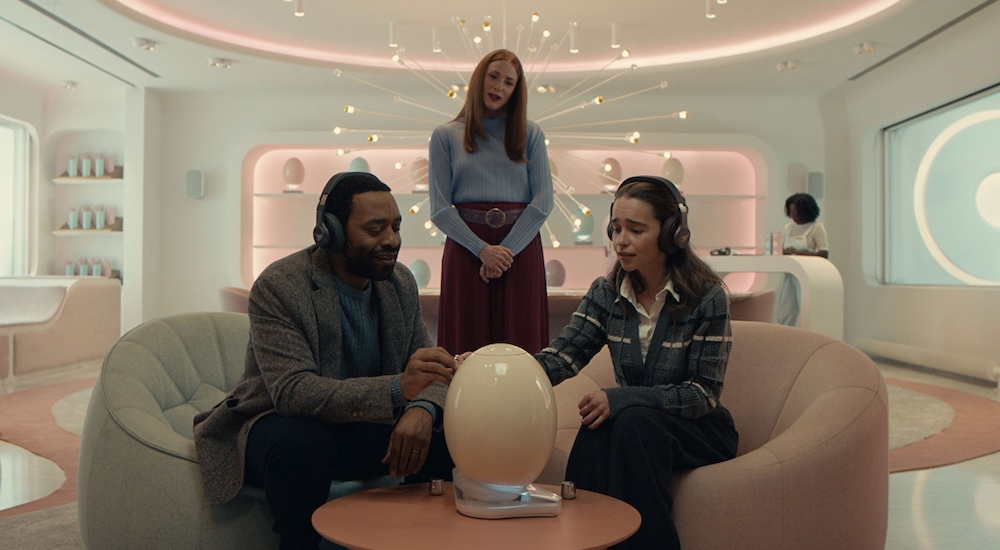“We humans have always managed to control nature,” declares a character in The Pod Generation. This sentiment, and its repercussions, lie at the heart of the new film by Sophie Barthes. It is a thought experiment about how, if technology keeps making our world “easier”, it could affect such basic human functions as pregnancy and motherhood. While unable to stick the landing, The Pod Generation does some great world-building anchored by performances from Emilia Clarke and Chiwetel Ejiofor.
Clarke and Ejiofor play Rachel and Alvy, a couple living in 22nd-century New York. Rachel is a high-powered executive at one of the biggest tech companies in the world while Alvy is a botanist and professor that works with plants (and plant holograms). Rachel is offered a promotion that comes with access to the Womb Center, a company that provides couples a convenient pregnancy via detachable artificial wombs, or pods. Alvy, a staunch believer in doing things the natural way, goes along reluctantly.
Learning about the technology of the 22nd century is part of the fun of the film. Alexa-like AIs 3D-print toast, track a person’s productivity and happiness and even serve as therapists. People feel like they never need to leave the city thanks to “nature pods” that offer calming on-screen sceneries surrounded by plants. The wealthy pay for pod pregnancies to be able to “share” the pregnancy and ensure that women are not hindered in their careers. It all feels like the natural extension of our current landscape, especially since more and more celebrities utilize surrogates for their pregnancies.
Surrounded by so much tech, Clarke and Ejiofor work to anchor the film with their very human relationship. It’s clear that while this couple has different beliefs, they’ve been together long enough that they know how to compromise and work as a team. While Clarke’s American accent is distracting, Rachel’s struggle to balance her career, her relationship, her new motherhood, and how she should feel about it all is inherently relatable. It also makes complete sense that America and New York are the perfect settings. Who cares more about efficiency and productivity than America? As a tour guide mentions when touring a preschool run by the same company Rachel works for, in the 22nd century, “our government is no longer funding public education,” but companies are here to do it better and more efficiently!
While the world-building is fun, The Pod Generation falters in its final act. Watching Rachel and Alvy go through pod pregnancy is fascinating but it all builds to a rushed ending that very plainly feels like Barthes didn’t know how to end the film. She asked a question and created a world to answer it, but that doesn’t necessarily create a satisfying narrative arc.
Still, the questions The Pod Generation poses are valid and relevant to today’s society where technology bleeds into all aspects of our lives, from cars to meals to relaxing apps on our phones. While the ending feels rushed, the film’s exploration of motherhood and marriage both today and in the future are prescient. Guess we’ll just have to wait and see how true it rings in a hundred years or so.

